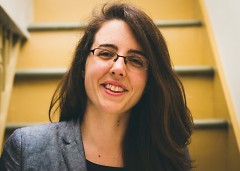The Community Media Center’s Elevating Voices Project aims to raise the visibility of diverse voices by providing the access, training and tools necessary for individuals to tell their stories, right in the neighborhoods where they live and work. Currently the CMC is working with 12 Grand Rapid’s nonprofits to collect stories from the communities they serve. In early 2015, the CMC will then move on to partner with four to six of the nonprofits in creating media hubs in their neighborhoods.
In July, the CMC hired Jen Vander Heide as the Elevating Voices’ project coordinator. Vander Heide has a master’s degree in Film Studies from the University of Wisconsin-Madison and taught in higher education for several years before working, more recently, for a local nonprofit.
On a sweltering hot afternoon in August 2012, I found myself sitting in my back yard in South East Grand Rapids with my 5, 9 and 12-year-old neighbors. The boys had wandered over earlier to see if I wanted to play basketball, but because of the heat, we were instead keeping to the shade and discussing their favorite topic: superheroes.
I will be honest that I am not a big fan of superheroes nor am I all that knowledgeable about them. And our conversation that afternoon probably wouldn’t have stuck with me if it weren’t for the boys’ response to a question I asked in passing. Noticing that my neighbors, who were black, were only naming and discussing white superheroes, I inquired about their favorite black superhero. Their answer: they didn’t have one.
There are probably many reasons why they responded the way they did: personal taste, degree of media exposure or range of knowledge about superheroes. Yet it seems to me that the primary reason is the troubling fact that when it comes to the media, there is still little diversity in what is shown back to us. If we believe what we see, then we must come to the conclusion that the world we live in is primarily male, white, able-bodied and straight. Going back to superheroes, just take a look at the leads in the most recent batch of films to come out this summer: "Captain America: The Winter Soldier," "The Amazing Spider-Man 2," "X-Men Days of Future Past," and "Guardians of the Galaxy."
I don’t know what it is like to grow up black in America. But, growing up gay in small-town America in the 1990s, I do know a bit about what it is to look out into the world and to find yourself either completely absent in a story or present only as a flimsily constructed caricature. Never seeing myself and my experience represented as I grew up confused me and caused me, for many years, to doubt my own worth. Later, still finding limited representation, I grew angry and frustrated.
Author Walter Dean Meyers, in his New York Times piece “Where Are The People of Color in Children’s Books," wrote powerfully about our fundamental need for representation, explaining how finding oneself in a story brings for readers “a validation of their existence as human beings, an acknowledgment of their value by someone who understands who they are.” Truthful representation is an affirmation of our humanity. It is a statement that, yes, we do exist, and, yes, we do matter.
Acknowledgement through representation is not only essential for the underrepresented amongst us, however. It is also essential for the rest of us too. If we are to grow as a healthy society, we must learn to value each other. It is hard to learn to value, though, the people you don’t see or you don’t hear. It is also hard to value the people you only see or hear in limited and stereotyped ways.
In sum, this nonexistent, restricted, or untruthful representation profoundly impacts us as a whole. It breeds pain, frustration and anger for those whose representation is at stake. It breeds ignorance, fear and apathy in the rest of us.
This is why the Elevating Voices project matters and why I am absolutely honored to come on board as the project coordinator. In the coming months we will be gathering, in conjunction with 12 Grand Rapids nonprofits, stories from a vast array of people in our city. This is a moment for us to take very small, concrete steps towards expanding the media landscape.
It is also a moment for us to work on telling and hearing the truth about the lived experiences of us all.
The Rapidian, a program of the 501(c)3 nonprofit Community Media Center, relies on the community’s support to help cover the cost of training reporters and publishing content.
We need your help.
If each of our readers and content creators who values this community platform help support its creation and maintenance, The Rapidian can continue to educate and facilitate a conversation around issues for years to come.
Please support The Rapidian and make a contribution today.
